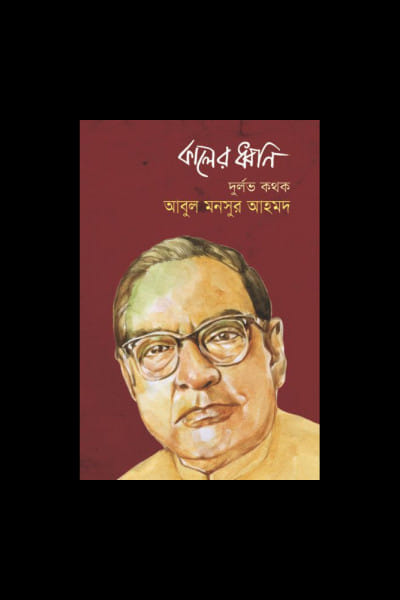Durlov Kothok: Abul Mansur Ahmad
THE book is a voluminous work on the late politician, lawyer, journalist and litterateur Abul Mansur Ahmad who has left behind a rich legacy of literary works for the present day readers to read and draw on. The book contains effervescent comments by eminent personalities of the country on the creative genius of Abul Mansur Ahmad as reflected in all the branches of work – politics, journalism and literature –that he was involved in. The book Durlov Kothok: Abul Mansur Ahmad would transport the reader to the decades of verve and vitality in which Abul Mansur Ahmad lived, did politics and wrote so elegantly.
He wore three hats simultaneously with distinction - that of a politician, a journalist and a litterateur. In his literary works satire was his forte. He was the editor of Daily Krishak, Nabajug and Ittehad in undivided Bengal and practiced progressive journalism.
Abul Mansur Ahmad was the provincial education minister in the Jukto Front cabinet under Sher-e-Bangla AK Fazlul Huq and the central commerce and industries minister in the Awami League government led by Prime Minister Hossain Shaheed Suhrawardy. He was a strong voice in articulating the interests of East Bengal.

Abul Mansur Ahmad believed in and propagated secularism in the troubled decades of the 1940s, 50s and 60s. He contributed significantly to the Language Movement as editor of the Ittehad.
He was the author of the Ekush Dafa (21 Point Demand) election manifesto of Jukta Front, a coalition of Sher-e-Bangla AK Fazlul Huq, Moulana Bhashani and Shaheed Suhrawardy, in the 1954 election in which the Muslim League was literallly obliterated.
In the editorial of the book titled, "Saral Samikkhane samayer dulrov kothok, Imran Mahfuz wrote:
"Abul Mansur Ahmed was a fearless fighter in a time when hope was less than just a glimmer for this nation. He clearly voiced his opinions against crime and injustice. Fear could never hold him back when it came to expressing his own thoughts. His dedication and love for his country was exemplary. He was regarded as a man of invaluable traits which is the reason why he is still such a popular literary figure in this generation.
"Abul Mansur Ahmad guided the people of Bangladesh with his intellect and political insight. His choice of weapon was his pen and his ammunition was his use of satire in his literary works. He captured the political essence as well as expressed patriotism through his satires. His never ending optimism could be felt through the lines of each of his stories. As more time passed, his work became more influential. His literature was instrumental in restoring back people's sense of nationality and patriotism that wavered at times. In order to experience what true patriotism embodies, his books are a must read.
"Abul Mansur Ahmad's works carry a lot of relevance even to this day. His writings encompass many different areas - from social to political, from religion to culture. He drew attention of readers to inconsistencies that were prevalent in society and tried to give the people a new sense of direction."
The book contains the following works:
Sahittay Mullyaon (Literary Evaluation):
1) Abul Mansur Ahmad Smorone- Justice Abdur Rahman Choudhruy (pg#19)
2) Jekhaane Abul Mansur Ahmad Swatantra- Sirajul Islam Chowdhury (pg# 23)
3) Abul Mansur Ahmad Er Shahittay Charcha Proshonge- Mohammad Moniruzzaman (pg#26)
4) Durlov Lekhok Abul Mansur- Al Mahmud (pg#30)
5) Abul Mansur Ahmad: Protishthhata Pitripurushder Ekjon- Akhtar-Ul- Alam (pg#32)
6) Abul Mansur Ahmad: Prashangik Granthaparichay - Rafiqul Islam (pg#35)
7) Litterateur Abul Mansur Ahmad- Abul Kalam Manzur Morshed (pg#42)
8) Abul Mansurer Jibon Darshan: Jibon Khudhhar Darpan e - Jatin Sarkar (pg#46)
9) Abul Mansur Ahmad- Syed Abul Maksud(pg#55)
10) Bhashar Swatantra: Abul Mansur Ahmad- Shah Khairul Bashar (pg#60 )
11) Shokiyotai Nandito Abul Mansur Ahmad - Moniruzzaman(pg# 65)
12) Abul Mansur Ahmad: Katha Shahittay- Sajjad Kadir (pg#72 )
13) Abul Mansur Ahmad:Kaaler Utkrishtha Fashal- Anowara Begum (pg# 74)
14) Abul Mansur Ahmad- Ghalib Asaddullah (pg#89 )
15) Abul Mansur Ahmad: Tar Swatantra- Dr. Nurul Amin (pg#95 )
16) Jibon-Khudhha: Proshongo Deshbhagh- Dr. Abdur Rahim(pg# 100)
17) Biddhruper Ghono Taul e "Karmanasha-Aynar Satya Mitthya- Shahid Iqbal (pg# 102)
18) Gulliverer Safar Namar Katha- Khondokar Mahmudul Hasan(pg#111 )
19) Bahumattrik Chetonai Abul Mansur- Mahmud Kamal (pg# 119)
20) Bangladesh er Kalochar Bishoyok Chinta- Dr. Mizanur Rahman(pg#123 )
21) Durlobh Ei Alo: Chanchal Bose(pg#186 )
22) Proshongo Aynar Namkaran – Rishin Parimal(pg#149 )
The book also contains the following chapters:
Bango Shilper Mullyaon (Evaluation of Satire)
Rajnoytik Bisleshon (Political Analysis)
Sangbaadpatra O Sangbaadikota ( Newspaper and Journalism)
Jibon Darshan (Philosophy of life)
Buddhibrittik Charcha: Bhasha
Buddhibrittik Charcha: Dharma-Darshan
Ainjibi
Smritikatha O Mulyaon: Paribar
Smriticharan: Anannya
Parishista: 1
Parishista: 2
The book will be launched on Wednesday 18 March 2015, on the occassion of death anniversay of Abul Mansur Ahmad, at Shilpakala Academy's National Art Gallery at 5:00pm.
-- Shahnoor Wahid & Supriti Sarkar

 For all latest news, follow The Daily Star's Google News channel.
For all latest news, follow The Daily Star's Google News channel. 



Comments